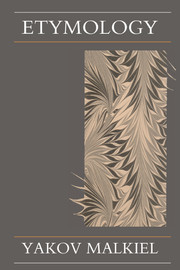1 - The nineteenth century
Published online by Cambridge University Press: 05 June 2012
Summary
In different times and at different places, etymology has meant slightly or entirely different things to the few or many people who, under varying sets of circumstances, have used that word, applying it to their own spheres of interests. Basically, etymology always meant something approximating to the paraphrase ‘original meaning, or use, of a given lexical unit or proper name’. But the cultural implications of this lame descriptive statement can be entirely different. The core meaning of a word can be imagined as something wholly independent of the passage of time and endowed with magic messages or mystic overtones.
The appeal to etymology in a magic context may well have started with proper names and be so old as to have its roots in prehistory. Parents, by giving their newborn child a name whose ‘real’ meaning is wholly transparent to those familiar with the given language (like Spanish Dolores, Consuelo, or Amparo, or Hebrew Rachel), or transparent only in part, or else to experts alone, may to some extent be motivated in their choice by this chance to encode a wish for the child's future well-being or expected character (standard of behaviour), even though several alternative motivations may prevail. To the extent that the real meaning of a name titillates the speech community's, or certain outsiders', curiosity, the etymology comes close to resembling the riddle, and the etymologist, in being called upon to solve or clarify it, acts like a magus or a magician.
- Type
- Chapter
- Information
- Etymology , pp. 1 - 40Publisher: Cambridge University PressPrint publication year: 1993

